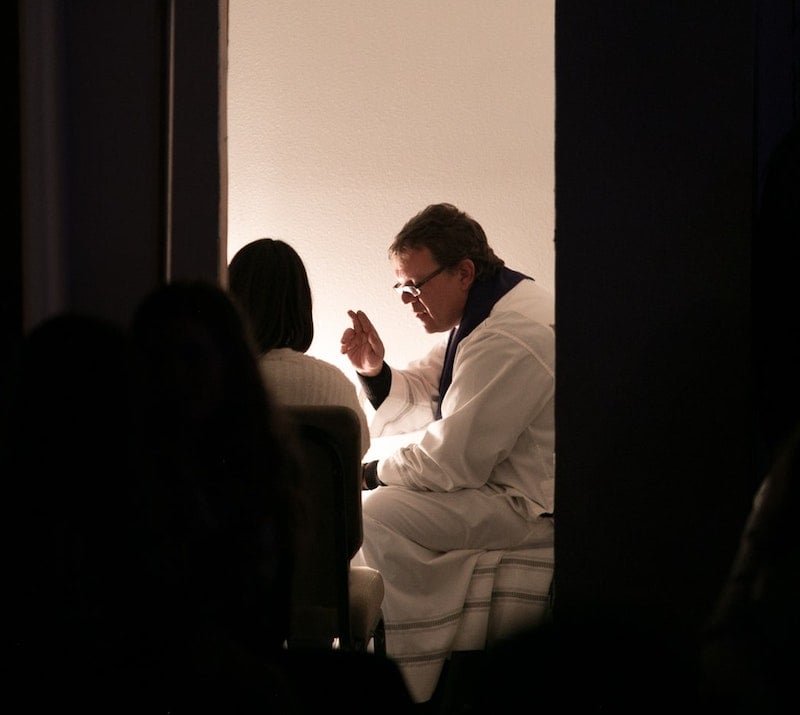
Confession is one of the most misunderstood sacraments in the Catholic Church. If you are a practicing Catholic, you have undoubtedly been asked “Why do you go to confession?” or “Can’t you just confess your sins to God directly?”
While this sacrament is a powerful and scripturally based sacrament, it can be hard to understand and even harder to explain. Many Catholics are afraid to go to confession out of shame or fear, but when we participate in this sacrament, the experience is exactly the opposite. In confession, we have the chance to come face to face with God’s mercy and love.
As Catholics, one of the most important things we can do is grow in our knowledge of this sacrament – to help us more fully receive God's mercy personally and to give us the ability to properly share it with others.
What is it?
Confession is a sacrament, and therefore it carries invisible grace that affects our souls. Like all of the sacraments, the act of confession is a tangible sign of an inward reality. In receiving this sacrament, the faithful receive “...an increase of spiritual strength for the struggle of Christian living”. (CCC 311)
Confession is also called the sacrament of penance or reconciliation. These names describe the different aspects of the sacrament. Penance describes the restoration of our hearts through expressing our sorrow for our sins and participating with both an interior and exterior penance. Reconciliation reveals that the sacrament restores our relationship with God and reconciles us with one another, restoring our union with His Church.
In confession, we share our sins clearly with a priest who acts in the person of Christ. With the authority of Jesus, the priest listens, offers guidance, provides a penance and speaks the words of absolution or forgiveness over the person confessing (the penitent).
Jesus Himself instituted this sacrament when He gave the power to forgive sins to the apostles when He appeared to them after His resurrection:
“'As the Father has sent me, even so I send you.’ And when He had said this, He breathed on them, and said to them, ‘Receive the Holy Spirit. If you forgive the sins of any, they are forgiven; if you retain the sins of any, they are retained.’” (John 20:21-23)
In giving them the gift of the Holy Spirit, Jesus explicitly sends His disciples out to use this power to forgive people’s sins. He also specifies that this power includes retaining the sins if needed.
Of course, Jesus wants all people to receive God’s mercy and forgiveness, but an essential part of the exchange of mercy is expressing contrition for our sins and making a firm commitment to change.
This is why, if this is found to be lacking, then the confessor has the authority to not offer absolution. However, this is not common and in situations where this is appropriate, the priest must provide guidance to the penitent about what obstacles remain to be overcome in order to help the person experience true reconciliation with God.
(https://attleborocatholics.org/sacraments/sacrament-confession)
Why do we need it?
While we receive the gift of salvation in the sacrament of baptism, all people still battle with sin due to the consequences of the fall. Because of this, the gift of confession gives us the opportunity to begin again and experience God’s mercy and forgiveness when we fall.
From the early Church, Christians have believed that confession is a vital part of living a faithful life. We need the sacrament first and foremost because it brings reconciliation with God and the forgiveness of our personal sins. But we also receive many graces through this sacrament, which restore us to wholeness and bring peace, serenity of conscience and spiritual consolation. (CCC 310)
When do we need to go to confession?
The Church teaches that all Catholics are required to go to confession once a year. However, it is good to make it a habit of going to confession at least once every few months. This helps us to make a practice of examining our consciences and to continue growing in the spiritual life. Pope Francis shared that he receives the sacrament of reconciliation every two weeks and considers it to be "the best path to spiritual healing and health”.
It is important to note that the Church also teaches confession is necessary when in a state of mortal sin, and that anyone who is conscious of grave sin may not receive the Eucharist without first having gone to confession (CCC 916). This is because mortal sin separates us from God and closes our hearts off to the grace we receive in Communion.
Here's a quick rundown of how to identify mortal vs. venial sins:
Mortal vs. Venial Sin
A mortal sin is committed when there is:
Full Knowledge that the act (thought, word or omission) possessed by the offender was contrary to God’s will (sinful)
Full Consent (with intentionality; i.e., not forced) is held by the one committing the sin
Grave Matter (anything under the Ten Commandments and the Precepts of the Church) is the circumstance of the sin
If any of these three conditions are not met, the sin is to be known as venial. It is still good to confess venial sins because these sins (like all sins) offend God and strain our relationship with Him.
The most important thing to remember is that these rules are put in place to help us have proper guidance and boundaries as we strive to grow closer to Jesus in the Christian life. He is always going to welcome us with His mercy regardless of how long it has been or what sins we have committed (or not committed), and nothing should keep us from receiving the gift of confession.
What do you do when a priest gives you advice contrary to the Church?
Despite the fact that confession is a sacrament, it is still administered by human and imperfect people. Similar to the sacrament of marriage, which can dissolve if one or both parties does not uphold the dignity of the sacrament, the same can be said of confession. The difference is the priest is standing In Persona Christi, which is Latin for “in the person of Christ”. This means that the priest acts in representation of the Lord, in the very Person of the risen Christ, who makes Himself present with His truly effective action. (www.linktoliturgy.com)
So, while this sacrament is between two people, as in marriage – one is perfect: God.
It is actually only the penitent who can alter the validity of the sacrament by either withholding sin or not completing a penance. Even if a priest gives poor advice, falls asleep during your confession (based on a real-life experience 😅) or God forbid, acts in a way that is disrespectful to the person confessing – the grace of the sacrament still stands.
Saint Faustina records some beautiful quotes about this in her diary:
“When you approach the confessional, know this, that I Myself am waiting there for you. I am only hidden by the priest, but I Myself act in your soul.” (Diary, 1602)
“Just as you prepare in My presence, so also you make your confession before Me. The person of the priest is, for Me, only a screen. Never analyse what sort of a priest it is that I am making use of; open your soul in confession as you would to Me, and I will fill it with My light." (Diary, 1725)
Above all, we must remember that confession is not about God’s punishment, but about His desire to heal us.
Our Creator knows how deeply our sin can wound us and blur our spiritual vision, keeping us from living out the life He has planned for us. Confession, far from being a tool to punish us, is a personal invitation to receive God's mercy and grace. While it can be scary or uncomfortable at times, it truly is an irreplaceable gift in the life of a Christian.
Let us pray for the grace to receive this gift and enter into Confession with child-like trust and confidence in God’s never-ending mercy.




Submit a Comment